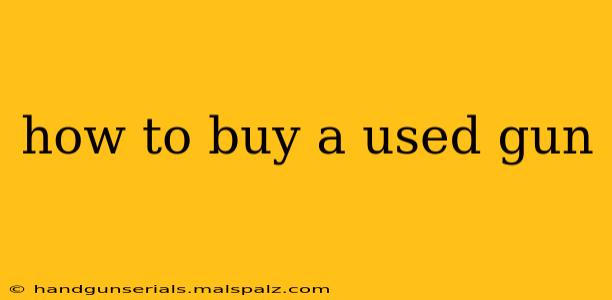Buying a used gun can be a cost-effective way to acquire a firearm, but it's crucial to navigate the process responsibly and legally. This comprehensive guide outlines the steps involved, emphasizing safety and compliance with all applicable laws. Remember, regulations vary significantly by state and even locality, so always confirm local laws before proceeding. This information is for guidance only and should not be considered legal advice. Consult with legal professionals and your local law enforcement agencies for definitive answers.
Understanding the Legal Landscape
Before even considering a purchase, familiarize yourself with your state's and local laws regarding firearm ownership and transfers. Key aspects to research include:
- Licensing Requirements: Do you need a license to own a firearm in your area? What are the application procedures and waiting periods?
- Background Checks: Are background checks required for all firearm transfers, including private sales? Understand the process and what information you'll need to provide.
- Waiting Periods: Are there mandated waiting periods between purchase and taking possession of the firearm?
- Restricted Firearms: Are there specific types of firearms prohibited in your area?
- Record-Keeping: Are you required to maintain records of your firearm purchases?
Finding a Used Gun: Sources and Considerations
Several avenues exist for purchasing used firearms. Each has its own set of advantages and disadvantages:
- Licensed Dealers: Purchasing from a licensed dealer offers several benefits, including a background check and the assurance that the firearm is legally obtained. However, prices may be slightly higher than private sales.
- Gun Shows: Gun shows can offer a wide selection of used firearms, but it's crucial to verify the seller's legitimacy and the firearm's legal status. Background checks may or may not be required, depending on your state's laws.
- Online Marketplaces: Online platforms allow for a broader reach, but exercise extreme caution when dealing with unfamiliar sellers. Verify their credentials and meet in a safe, public location for the transaction.
- Private Sellers: Private sales can offer the best prices, but they also carry the most risk. Always prioritize safety and legal compliance.
Due Diligence: Inspecting the Used Gun
Thoroughly inspecting the firearm before purchase is paramount. Pay close attention to these aspects:
- Mechanical Condition: Check for any signs of damage, rust, or wear and tear. If possible, have a qualified gunsmith inspect the firearm.
- Functioning: Test-fire the firearm (where legally permissible and with proper safety precautions) to ensure proper functioning and accuracy.
- Serial Number: Verify the serial number against any stolen firearm databases available to you.
- Documentation: Request any available documentation related to the firearm's history.
Completing the Transaction Safely and Legally
Follow these guidelines when completing the purchase:
- Safe Transfer: Meet in a well-lit, public place, preferably with a witness present.
- Payment: Use a method that provides a verifiable record of the transaction, such as a check or cashier's check. Avoid cash transactions.
- Paperwork: Obtain a bill of sale or other documentation that records the transaction.
- Legal Compliance: Ensure you adhere to all federal, state, and local regulations regarding firearm transfers.
Post-Purchase Responsibilities
After acquiring a used firearm, you are responsible for its safe and legal storage and handling:
- Safe Storage: Store the firearm securely to prevent unauthorized access, especially from children.
- Proper Handling: Always handle firearms responsibly and safely.
- Ongoing Maintenance: Regularly maintain the firearm to ensure its continued safe and reliable operation.
Disclaimer
This guide provides general information and should not be considered legal advice. Laws regarding firearm ownership and transfer vary widely, and it's crucial to consult with legal professionals and your local law enforcement agencies for specific guidance in your area. Always prioritize safety and legal compliance when buying, owning, and handling firearms.

